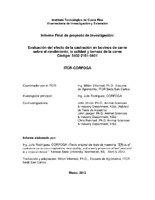Evaluación del efecto de la castración en bovinos de carne sobre el rendimiento, la calidad y terneza de la carne
Date
2012Author
Villarreal-Castro, Milton
Rodríguez, Julio
Unruh, John
Jaeger, John
Reinhart, Chris
Metadata
Show full item recordAbstract
Forty-eight (3/4 Brahman × 1/4 Charolais) male calves were used to determine carcass cutability and quality characteristics of steaks from four muscles aged for 2, 7, 14, or 28 d from intact bulls and steers castrated at 3, 7, or 12 mo of age grown under tropical pasture conditions. The experiment was conducted as a randomized complete block design with animal as the experimental unit and harvest group as a blocking factor with aging period as a repeated measure for Warner-Bratzler shear force (WBSF). Male calves were randomly assigned at birth to castration treatments, weaned at 7 mo, and raised together their entire life on pasture in Costa Rica. At 26 mo of age, three cattle from each treatment were harvested in 1 of 4 groups at a commercial harvest facility. Strip loin (Longissimus lumborum, LL), tenderloin (Psoas major, PM), top sirloin butt (Gluteus medius, GM), and eye of round (Semitendinosus, ST) steaks were aged for 2, 7, 14, or 28 d for WBSF. A sensory panel was conducted for all four muscles aged for 14 d from intact bulls and steers castrated at 3 mo of age. Live BW, carcass traits, and total subprimal yields were not affected (P ≥ 0.10) by male sex condition. For PM, GM, and ST steaks, WBSF values were similar (P ≥ 0.41) for steaks from intact bulls and steers castrated at all ages. For both PM and GM, steaks aged for 28 d had the lowest (P < 0.05; most tender) WBSF
34
values and steaks aged for 2 d had the highest (P < 0.05, toughest) WBSF values. For the ST, WBSF values were highest (P < 0.05) for steaks aged 2 d. A treatment × aging interaction (P < 0.05) was detected for LL WBSF values. At 14 d of aging, LL WBSF values from steers castrated a 3 mo tended (P = 0.07) to be lower than those LL steaks from intact bulls. At 28 d of aging, steaks from steers had lower (P < 0.05) WBSF values than steaks from intact bulls and steaks from steers castrated at 3 mo tended (P = 0.07) to have lower WBSF values than steaks from steers castrated at 12 mo. For LL steaks from steers castrated at 3 mo, steaks aged for 28 d had lower (P < 0.05) WBSF values than steaks aged 2, 7, or 14 d and steaks aged 14 d had lower (P < 0.05) WBSF values than those aged 2 d. For LL steaks from steers castrated at 7 mo, steaks aged 28 d had lower (P < 0.05) WBSF values than steaks aged 2, 7, or 14 d. For LL steaks from steers castrated at 12 mo and intact bulls, steaks aged 28 d had lower (P < 0.05) WBSF values than steaks aged for 2 or 14 d. Although all sensory panel data collected were not statistically different (P > 0.05), LL steaks from steers castrated at 3 mo tended (P = 0.17) to have higher (more tender) overall tenderness scores than steaks from intact bulls. The GM followed a similar trend with steaks from steers castrated at 3 mo having higher scores for myofibrillar (P = 0.14) than steaks from intact bulls. This study indicates that castration at 3 mo would be the recommended production practice as it provided the greatest improvement LL tenderness over intact bulls with no differences in carcass traits or subprimal yields. The degree of improvement in tenderness due to aging appears to be muscle dependant.
Description
Proyecto de Investigación (Código: 5402-2151-8401) Instituto Tecnológico de Costa Rica. Vicerrectoría de Investigación y Extensión (VIE). Escuela de Ingeniería en Agronomía; Corporación Ganadera CORFOGA; Kansas State University, 2012


